第7章
There was at court a man pre-eminent among the rulers, of virtuous life and devout in religion. But while working out his own salvation, as best he might, he kept it secret for fear of the king. Wherefore certain men, looking enviously on his free converse with the king, studied how they might slander him; and this was all their thought. On a day, when the king went forth a-hunting with his bodyguard, as was his wont, this good man was of the hunting party. While he was walking alone, by divine providence, as I believe, he found a man in a covert, cast to the ground, his foot grievously crushed by a wild-beast. Seeing him passing by, the wounded man importuned him not to go his way, but to pity his misfortune, and take him to his own home, adding thereto: "I hope that I shall not be found unprofitable, nor altogether useless unto thee." Our nobleman said unto him, "For very charity I will take thee up, and render thee such service as I may. But what is this profit which thou saidest that I should receive of thee?" The poor sick man answered,"I am a physician of words. If ever in speech or converse any wound or damage be found, I will heal it with befitting medicines, that so the evil spread no further." The devout man gave no heed to his word, but on account of the commandment, ordered him to be carried home, and grudged him not that tending which he required. But the aforesaid envious and malignant persons, bringing forth to light that ungodliness with which they had long been in travail, slandered this good man to the king; that not only did he forget his friendship with the king, and neglect the worship of the gods, and incline to Christianity, but more, that he was grievously intriguing against the kingly power, and was turning aside the common people, and stealing all hearts for himself.
"But," said they, "if thou wilt prove that our charge is not ungrounded, call him to thee privately; and, to try him, say that thou desirest to leave thy fathers' religion, and the glory of thy kingship, and to become a Christian, and to put on the monkish habit which formerly thou didst persecute, having, thou shalt tell him, found thine old course evil." The authors of this villainous charge against the Christian knew the tenderness of his heart, how that, if he heard such speech from the king, he would advise him, who had made this better choice, not to put off his good determinations, and so they would be found just accusers.
But the king, not forgetful of his friend's great kindness toward him, thought these accusations incredible and false; and because he might not accept them without proof, he resolved to try the fact and the charge. So he called the man apart and said, to prove him, "Friend, thou knowest of all my past dealings with them that are called monks and with all the Christians. But now, I have repented in this matter, and, lightly esteeming the present world, would fain become partaker of those hopes whereof I have heard them speak, of some immortal kingdom in the life to come; for the present is of a surety cut short by death. And in none other way, methinks, can I succeed herein and not miss the mark except I become a Christian, and, bidding farewell to the glory of my kingdom and all the pleasures and joys of life, go seek those hermits and monks, wheresoever they be, whom I have banished, and join myself to their number. Now what sayest thou thereto, and what is thine advice? Say on; I adjure thee in the name of truth; for I know thee to be true and wise above all men."The worthy man, hearing this, but never guessing the hidden pitfall, was pricked in spirit, and, melting into tears, answered in his simplicity, "O king, live for ever! Good and sound is the determination that thou hast determined; for though the kingdom of heaven be difficult to find, yet must a man seek it with all his might, for it is written, `He that seeketh shall find it.'
The enjoyment of the present life, though in seeming it give delight and sweetness, is well thrust from us. At the very moment of its being it ceaseth to be, and for our joy repayeth us with sorrow sevenfold. Its happiness and its sorrow are more frail than a shadow, and, like the traces of a ship passing over the sea, or of a bird flying through the air, quickly disappear.